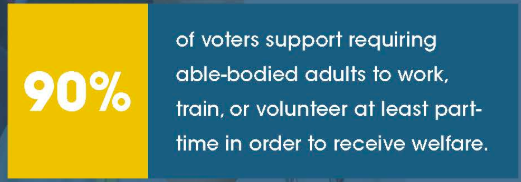U.S. District Judge James Boasberg ruled against New Hampshire’s work requirements for able-bodied recipients of expanded Medicaid benefits on Monday, even as polls show requiring work for welfare has broad bipartisan support.
Boasberg, an Obama appointee, is the same judge who shot down similar requirements in Kentucky and blocked Arkansas from implementing its Medicaid work requirements.
“The decision today is disappointing but not surprising given this judge’s past rulings. New Hampshire’s work requirement is a key provision of the bipartisan Medicaid expansion bill that passed with overwhelming support in the legislature,” Gov. Chris Sununu said in a statement.
And that bipartisan support extends well beyond the confines of Concord. Polls show Americans overwhelmingly support work requirements for able-bodied welfare recipients, including surveys by left-leaning organizations like the Kaiser Family Foundation (72 percent support) as well as the pro-welfare-reform Foundation for Government Accountability (75 percent).
“Americans absolutely support work requirements for welfare and, unlike a lot of issues right now, it crosses party lines, says Sam Adolphsen of the FGA. “This ruling is another case of an activist judge appointed by President Obama–who was the author of the Medicaid expansion–bizarrely saying he doesn’t believe it furthers the objectives of Medicaid. That’s just flat wrong.
“A core mission of Medicaid and all government welfare programs is to help people become both healthier and financially self-sufficient,” Adolphsen said.
State Senator Cindy Rosenwald (D-Nashua), who supports the judge’s ruling, couldn’t disagree more.
“Medicaid is a health insurance program, that’s all,” Rosenwald said. “And many of the so-called ‘able-bodied’ have real mental health issues that keep them from working.”
Rosenwald argues that many of the 50,000 Granite Staters eligible for expanded Medicaid and who appear able-bodied aren’t actually able to work. “They may not be ill, but they have family members who are, or they have an addiction issue, or some other problem.”
Advocates for the work requirement point out that many people who pay for their own healthcare also have family and personal issues but find a way to show up for work every day. That’s another reason Americans support minimal work requirements.
And how does Rosenwald feel about the fact that work requirements are so popular with voters?
“People might say they support work requirements for welfare, but Medicaid isn’t welfare,” Rosenwald told NHJournal.
As Sununu noted, Baosberg’s rulings are all but certain to be challenged. “A ruling from one federal trial court judge in Washington, D.C. is only the first step in the process, and we are confident that New Hampshire’s work requirement will ultimately be upheld,” Sununu said.
Meanwhile, it gives the NHGOP yet another campaign issue–like impeachment, health care for illegal immigrants, and ending private medical insurance–where Democrats are underwater by 20 percent or more with voters. And the more working Granite Staters find out about the local plaintiffs in the lawsuit challenging the New Hampshire work requirement, the less sympathetic they’re likely to be.
“It is clear from today’s ruling that the courts agree that the Medicaid work requirement would cause undue harm to the most vulnerable people in New Hampshire causing them to lose their health insurance,” House Majority Leader, Doug Ley (D-Jaffrey) said in a statement. “It was unfortunate to see our Republican colleagues in the House remain steadfast in their support of the burdensome and unreasonable work requirement.”
As long as the Democrats’ position remains as unpopular as it is today, expect to see those same House Republicans trumpeting their “steadfastness” in campaign mailers next year.




